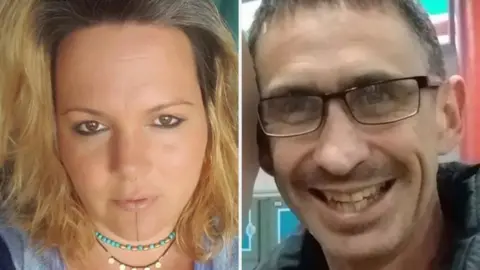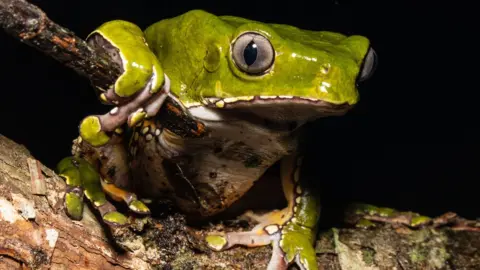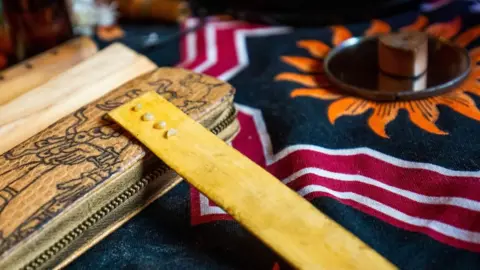Kambo: Australia investigates suspected frog mucus ritual deaths
 Supplied
SuppliedFor the past two weeks, a small courthouse tucked away in a lush corner of eastern Australia has heard confronting and unusual evidence about the sudden deaths of two locals.
Natasha Lechner died from a suspected cardiac event, while authorities believe Jarrad Antonovich died after injuries from severe vomiting.
Both incidents happened shortly after they used kambo - poisonous frog mucus - in an ancient Amazonian ritual.
And both took place in the northern New South Wales region - an area famous for its beautiful rainforests and stunning beaches, but also for its alternative therapy scene.
A coroner is now investigating what went wrong and if anything could have been done to save the pair.
What is a kambo ceremony?
Kambo - also known as sapo - is a waxy substance harvested by scraping the skin of a live giant monkey frog.
The frog, found throughout the Amazon, secretes the substance as a defence mechanism - to kill or warn off animals that try to eat it.
But in a kambo ceremony, humans use it to trigger an intense so-called detoxification process.
After participants drink over a litre of water, small burns are created on their skin and the substance is applied to the open wounds.
It causes blood pressure to rise, the heart to race and the body to purge by vomiting or defecating - often both. Symptoms range in severity, and typically last up to half an hour.
Indigenous people in South America have used kambo for centuries, believing it wards off bad luck and improves hunting skills.
 Getty Images
Getty ImagesThese days, it is a shamanic ritual which proponents assert rids the body of toxins, brings mental clarity and treats various illnesses.
But there is no research proving its supposed health benefits - and it is banned by Australian health regulators.
Kambo has been linked to deaths, seizures, liver failure, and heart attacks.
Families call for answers
On 8 March 2019, Natasha Lechner set up a kambo ceremony at her house in Mullumbimby - 20 minutes from the coastal town of Byron Bay.
She was morbidly obese and had turned to alternative medicines to manage chronic back pain.
But on that day, within seconds of applying kambo to five small burns on her chest and arm, she passed out. Minutes later, she was dead.
The 39-year-old had trained as a kambo practitioner just a couple of months before her death, but a court heard that she was not warned of the risk of sudden death that using kambo posed.
Despite being with another kambo practitioner, who started CPR, no ambulance was called for Ms Lechner until her housemate came home 10 minutes later, finding her friend "foaming" at the mouth. She is believed to have died of an "acute cardiac event".
Jarrad Antonovich's death on 16 October 2021 was more prolonged.
He was attending a six-day retreat in Kyogle, an hour inland from Byron Bay, when he took kambo. He too had chronic conditions - a brain injury acquired in a car accident two decades earlier, which left him with speech and movement difficulties.
An inquest this week heard the 46-year-old had looked unwell early on the day he died, and by nine or 10 hours later he was unable to walk unassisted and his face and neck were incredibly swollen.
At some point during the evening, he is believed to have also consumed ayahuasca - another drug, which along with triggering hallucinations, often induces severe vomiting.
By 23:30 he'd passed out, finally prompting someone to call an ambulance.
Paramedics later recalled some sort of "ceremony" continuing after they arrived, and being shooed away from Mr Antonovich by a woman who accused them of interfering with his "aura", the inquest in the NSW Coroner's Court heard.
No-one told the paramedics Mr Antonovich had consumed either kambo or ayahuasca. Instead, it was suggested to them that he was suffering from an asthma attack. In reality, his oesophagus had ruptured.
Both Ms Lechner and Mr Antonovich had turned to alternative therapies to fill a gap they felt had been left by traditional health care.
Now both of their families want answers. They accept their children took the substance voluntarily, but they question whether there was an unnecessary or unexplained level of risk.
Glen Antonovich, Jarrad's father, said "something didn't add up" and it "still doesn't".
"There was no medical staff, no risk mitigation," he told the inquest.
What happens next?
The state coroner will make findings and recommendations in relation to the two deaths.
The inquests have heard that identifying ways to prevent similar deaths in the future is a priority for Magistrate Teresa O'Sullivan - were there "opportunities missed" to help Ms Lechner and Mr Antonovich, or "safeguards" that should have been in place?
When Australia's Therapeutic Goods Administration (TGA) made kambo illegal in 2021, it listed it as a schedule 10 poison, the highest possible danger classification for medicines and chemicals.
"They're deemed to be of such great danger to human safety that you can't even use it in research," says Daniel Perkins, who heads a psychedelics research institute in Melbourne.
 Getty Images
Getty ImagesBut people who feel let down by traditional medicine are increasingly looking for alternative therapies.
"There's this growing proportion of people who have tried Western treatments - for primarily mental health conditions - and found that these just hadn't been successful," Dr Perkins says.
While some of these are risky, there is also debate over whether banning alternative therapies or drugs actually increases safety, he says. Though substances like ayahuasca have long been illegal, "if there's a demand for it, then people still use it… and you don't have any visibility about what is happening - either the benefits or harms that are going on."
When a medicine is decriminalised or regulated, authorities can ensure minimum safety standards - including training requirements, and product quality standards.
Dr Perkins points to the TGA's recent decision to allow the use of psilocybin - or magic mushrooms - and MDMA in limited medical circumstances. It made Australia the first country in the world to officially recognise psychedelics as medicines.
"You can provide a bit more guidance and a bit more surety to people who are doing that," he says.
"It may not work, but at least the experience they have will have to meet some sort of minimum safety standards."
